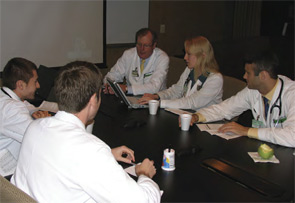“John played a critical role in revitalizing rheumatology in Nashville,” agrees Robert D. Inman, MD, professor of medicine and immunology at the University of Toronto. “As a medical resident at Vanderbilt, in 1975, I hadn’t decided what kind of specialty to pursue. John influenced me in a direct way towards rheumatology and communicated this great sense of excitement and enthusiasm, and I still try to mimic that element in my teaching.”

Coming Full Circle
Since he first enrolled at Vanderbilt University as a Founders’ Scholarship undergraduate nearly 50 years ago, John Sergent has served the university and rheumatology in numerous capacities. He was chief resident in medicine in 1971 and the first section chief of the division of rheumatology from 1975–1979. He later chaired the department of medicine at Vanderbilt-associated Saint Thomas Hospital and was chief medical officer of the Vanderbilt Medical Group from 1995–2003. In between, there was a stint in private practice, active (and continuing) involvement with the ACR (he was ACR president in 1992) and with the American Board of Internal Medicine (ABIM), where he chaired the Subspecialty Board on Rheumatology for an extended time to steer it through a redraft of the certification exam.
His peers, former students, and fellows agree that his current assignment aligns with his strongest talents as a teacher and clinician. Eric G. Neilson, MD, Hugh Jackson Morgan Professor of Medicine and Cell Biology and chair and physician-in-chief of the department of medicine at Vanderbilt, appointed Dr. Sergent to the position because, he says, “it was a good chance to match a great skill set to a challenging job.”
Says Dr. Vansant, “When they dragged John off into the world of administration for a few years, I told him, ‘J.S. [as he is affectionately known by some of his former fellows], you’ve shown that you can do anything, but your calling is mentoring young physicians.’ ”
Focus on Patients
As a Vanderbilt faculty member since 1988, Dr. Sergent’s warmth, good humor, and dedication to quality patient care have influenced many students and fellows. Dr. Inman notes that he still feels Dr. Sergent’s influence even in his lab-based research studies at the University of Toronto. “Keeping the patient’s care as the central motivating force has been a big factor in the translational aspect of our research,” he says.
Wonder Puryear Drake, MD, assistant professor of medicine in the division of infectious diseases at Vanderbilt, first encountered Dr. Sergent when she was a medical student from 1992–1994. “What I remember about Dr. Sergent as a teacher was his incredible fund of knowledge,” she says. “He could think not only broadly but also in great depth. And he was very committed to quality patient care.”
